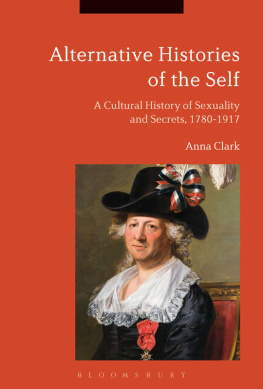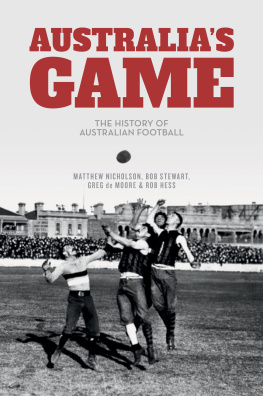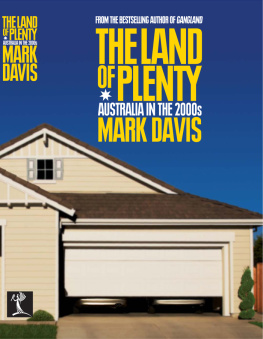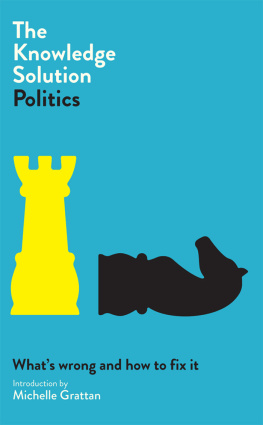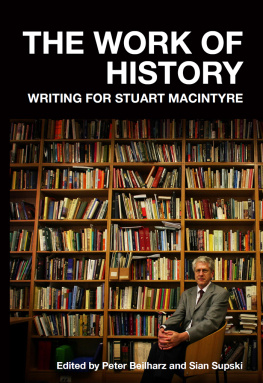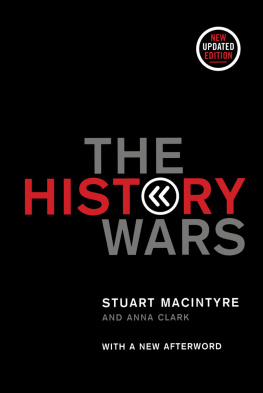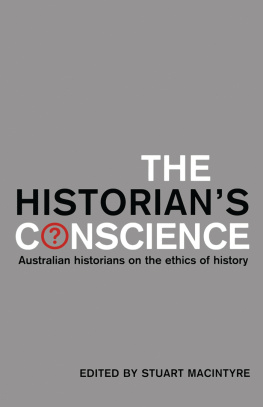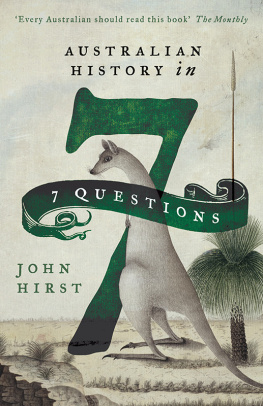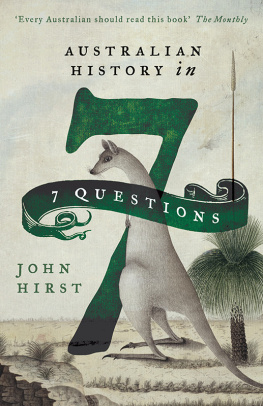The Knowledge Solution
Here are some highlights of the countrys best History writing from the MUP catalogue. Featuring thinkers from across the ideological and historical spectrum, their arguments about the discipline of Australian History are distilled in these extracts and essays.
The Knowledge Solution: Australian History is the second collection in a series that draws from the remarkable books published by Australias oldest university press.
The
Knowledge
Solution
Australian
History
Edited by
Anna Clark

MELBOURNE UNIVERSITY PRESS
An imprint of Melbourne University Publishing Limited
Level 1, 715 Swanston Street, Carlton, Victoria 3053, Australia
www.mup.com.au
First published 2019
Text individual contributors, various dates
Design and typography Melbourne University Publishing Limited, 2019
The contents for this title were curated under the RMIT Master of Writing and Publishing Fellowship. Thanks to Anthony Johnson for his contribution to this project.
This book is copyright. Apart from any use permitted under the Copyright Act 1968 and subsequent amendments, no part may be reproduced, stored in a retrieval system or transmitted by any means or process whatsoever without the prior written permission of the publishers.
Every attempt has been made to locate the copyright holders for material quoted in this book. Any person or organisation that may have been overlooked or misattributed may contact the publisher.
Cover design by Josh Durham, Design by Committee
Typeset by Megan Ellis
Printed in Australia by McPhersons Printing Group

ISBN 9780522875423 (paperback)
ISBN 9780522875430 (ebook)
CONTENTS
INTRODUCTION
Anna Clark
About ten years ago, when I was researching the state of Australian History teaching, I interviewed Jennifer Lawless, Inspector for History at the New South Wales Board of Studies. It was a time of apparent crisis: research had revealed more Australian students knew the presidents of the United States than Australias own leaders, and many didnt even know what historical event was actually marked by Australia Day.
Yet for Lawless, History was a challenging and slippery beast of passionate debates and even stronger beliefs. Developing History syllabuses was a nightmare, she explained. I get probably ten times more ministerials, letters and emails challenging whatever we have in the History curriculum than any other subject. Her comments pointed to a puzzle that persists still: despite the stigma of being boring, Australian History prompts extraordinary levels of public debate.
Prime Minister John Howards attempts at curriculum reform following the Cronulla riots in 2005 generated extensive disagreement among teachers, historians, politicians and public commentators, all of whom had strong opinions about what History was, how it should be taught, and why. Similarly heated contests took place over the representation of Indigenous histories at the National Museum of Australia, whether the Australian War Memorial should include reference to the frontier wars, and the question of an Apology to the Stolen Generations.
These so-called history wars have dominated public discourse over Australian history commentary for the better part of three decades, representing a polarised, political and very public series of disputes over the nations past. They demonstrate that Australian history is anything but dull.
In other words, doing History helps us make sense of ourselves, as well as the past itself.
Every generation asks its own historical questions and seeks out histories that speak to its own interests and concerns. In 1932, US historian Carl Becker gave his Presidential Address to the American Historical Association, and declared that history cannot be precisely the same for all at any given time, or the same for one generation as another. Doing History involves a conversation with the past, which changes according to whos conversing, where and when. A history of the White Australia Policy written in 1923 is not the same as histories two generations later, as this book confirms.

Whats the collective noun for a group of historians? An archive? That certainly seems apt for this collection of histories from the Melbourne University Publishing stable.
Its a modest span of ideas and timeone hundred and fifty years of history-makers from one Australian university press, in a nation where histories could be measured in millennia rather than print runs. And yet it also reveals a lot about this discipline we call History (with a capital H).
For a start, it shows how History in Australia has been interwoven with the nation. As the German historiographer Stefan Berger has noted, the persuasive nationalism that emerged across Europe during the nineteenth century was intimately entwined with the professionalisation of the History discipline. Nations needed history to make sense, a coherent narrative to offer citizens; History,
Australia was no exception, and the discipline of History emerged contiguously with national formation in the late nineteenth and early twentieth centuries. Education departments commissioned History texts, universities appointed History professors, and increasingly professionalised historical practice articulated its own sources and methods.
In that mould, the first book published by Melbourne University Press was Myra Willards (largely uncritical) history of the White Australia Policy. Its inclusion here is not to register support, but shows how such ideas were not only once mainstream, but also award-winning. Most of the histories in this collection are about Australia in some way, although their relationship with the idea of Australian national progress becomes increasingly fraught over the twentieth century.
Thats because the flip side of this anchoring of the History discipline with Australias national narrative is how it judges other forms of knowledge as inconsequential. Alexis Wright insists in her essay that scholarly and official history-making was a way of maintaining a national ideology that would continually remind Aboriginal people: we control you.
Such generational and methodological shifts across the twentieth century are perhaps most obvious in a collection of this type, where feminist histories of the Womens Christian Temperance Union and Indigenous histories, as well as Robert Reynolds history of homosexuality and Janet McCalmans history of class, sit alongside Geoffrey Blaineys popular and ultimately optimistic account of Australias mining history, The Rush that Never Ended (1964). Public and oral histories nestle among archival research, but also point to important shifts in the ways Australian history has been produced. These methods have pushed the boundaries of historical research and practice over time, as John Rickard and Peter Spearritt contend. Intimate histories of the body, of families, drunkenness and abortion produce very different readings of the past to Michael Cannons economic history of the nineteenth century land boom, published in 1966. Ray Parkins detailed micro-history of HM Bark Endeavour contrasts Rebe Taylors equally epic, but sweeping history of Aboriginal Tasmania.
But, as Rafaello Carbonis account of the Eureka Stockade demonstrates, Australian historiography isnt a linear story of progressive inclusiveness. His narrative, written seventy years before Willards study, not only exuberantly relives a major turning point in Australias democratic history, but also includes a plea for common humanity and fair government representation fifty years before the White Australia Policy.
Next page

